- Home
- Paul Christopher
The Sword of the Templars t-1 Page 8
The Sword of the Templars t-1 Read online
Page 8
“Not that I recall,” said Carr-Harris.
“Why would Grandpa keep the sword’s existence a secret?” Peggy asked.
“And why all the sudden interest now?” Holliday added.
“I’m not entirely sure,” mused Carr-Harris. “I do remember him swearing me to secrecy when we discovered it. Order of the New Templars. Black Shields and White Shields or some silliness like that. He seemed very serious about it.”
The old man clambered to his feet and picked up his empty glass.
“Drink?” he said, gesturing toward a simple wet bar on a table beneath one of the big lopsided windows to one side of the fireplace. There were half a dozen bottles of various liquors, a seltzer bottle, and several glasses.
Holliday and Peggy both declined. Carr-Harris shuffled across the room and poured himself another whiskey, adding a noisy spritz of soda. He turned and headed back to his seat, the ash on his cigarette now dangerously long.
The high-powered rifle bullet took the old man between the shoulder blades, exploding through his spine and bursting out of the center of his chest, blood spraying. His arms spread and the whiskey glass flew from his hand, his eyes already sightless as he fell. A heartbeat later the sound of the window breaking filled the room in a sudden, tinkling clatter, and then there was only silence.
10
They threw themselves onto the floor. In front of them the body of the old professor bled into the oval rug. A second shot entered through the already shattered window and thumped into the back of the couch. There was no other sound.
Suppressor, thought Holliday. Maybe an M4A1 like they’d used in Iraq. Mean suckers. A big-bore rifle for special operations, dead silent, dead accurate, and just plain deadly.
“Holliday?” Peggy said. Her voice was quiet and controlled. No panic. She’d taken her cameras into firefights before. She was waiting for some direction. There was a crash as another bullet smashed into the gun case on the far side of the room and another window blew out. A second shooter.
“Stay down,” said Holliday. He crabbed to the left, pulling himself around to the far side of the couch. A steady flurry of shots stitched their way across the bookcases, shredding the spines of books and sending a confetti storm of paper into the air. Bullets struck the side of one of the picture frames on the wall, splintering it and sending the painting spinning into the air. The bottles on the bar suddenly exploded, and the smell of liquor filled the air. The room was being steadily and inexorably eviscerated in absolute silence. It was terrifying. It was meant to be. Holliday stared at the gun case.
A bullet had hammered through the doorframe, exploding the lock and striking the stock of one of the standing rifles. It looked like an old Grulla Armas over and under shotgun from Spain. Several other weapons were still intact, including a Martini-Henry lever action dating back to World War I and a Lee-Enfield carbine.
There was one pistol, a Broomhandle Mauser with a heavy box magazine and the lumpy-looking polished wood grip that gave the weapon its name. On the shelf beneath the semiautomatic there was a blue and gold box of Serbian Prvi Partizan custom 9-mm parabel lum ammunition. The same stuff the bad guys used in Kosovo. From the illustration on the box it looked as though the bullets were preloaded onto stripper clips. Another flurry of shots and the crashing of another window, this time on his right. Firing from three sides now.
“What are you doing?” Peggy whispered, nervous now.
“Thinking,” said Holliday. “Hang on.”
“Doc? What’s going on?”
He didn’t bother answering. Instead he closed his eyes and tried to visualize the property. The fireplace was behind him: south. There was an open flower garden and patio on that side separating the house from the screening trees. He could see the patio through the shattered window.
The hallway they’d entered through was on his right: northeast. The oak-plank door, the side yard, and the car. Beyond the vehicles was the Dutch barn. No cover there, so that meant the shooter was in the trees. The window they’d fired through to hit the gun cabinet was on his left: west. The densest part of the windbreak and the closest to the house. Directly ahead of him there was an open archway leading into the old country kitchen. No windows that he could see, so no shot. Maybe a side door.
He opened his eyes and lifted his head an inch or two. They were shooting from the trees and not from the roofs of any of the outbuildings. No possible high ground. The terrain dropped slightly toward the north, but not appreciably. The ballistics decreed that the trajectories of the bullets would be flat unless they were up in the trees, which he doubted.
Holliday gritted his teeth in frustration. It had been a long time since he’d done this kind of thing for real. Too long. Old soldiers didn’t just fade away-they got rusty, as well.
He forced himself to stay calm and concentrate. He was boxed in on three sides. The two shooters east and south would keep them pinned down in a crossfire while the guy in the northeast would come in and take the oak-plank entrance. They wouldn’t wait too long. Another minute or two and they’d be coming in the windows, blasting away.
“Go to your right,” he called out. “Keep down. When you get beyond the couch, head for the archway and see if you can get into the kitchen. Wait for me.”
“What then?”
“Just do it.”
He heard her begin to move. There was another barrage of silent shooting that tore into the walls and smashed into furniture. Holliday rolled sideways across the floor and finally banged into the gun cabinet. Out of the corner of his eye he saw Peggy scoot by.
“Keep going!” he urged.
He watched her go past through the archway into the kitchen, and then he reached up blindly until his fingers closed on the cold metal of the old Mauser. He pulled the gun down and then reached up and fumbled for the box of ammunition. He tore it open and pulled out one of the twenty-round clips.
He retracted the bolt and felt it lock into place, then pushed in the clip from the top, loading the pistol like an old M1 Garand. The bullets clicked down against the magazine spring until the clip had fully loaded. He pulled out the empty strip and tossed it aside, then eased back the bolt. The gun was ready to fire. He jammed a couple of stripper clips into the pocket of his jacket, then lifted his head again, the Mauser gripped firmly in his right hand.
“I’m in the kitchen!” Peggy called.
“Coming,” said Holliday. He pushed up onto his hands and knees then sprinted for the archway into the kitchen. Too late. The oak-plank door at the end of the short hallway was thrown open on his right. A figure in hiking boots, jeans, and a dark green pullover surged into the hallway, a long-barreled weapon in his hand. Russian, a Bizon submachine gun with all the bells and whistles including a suppressor, a POSP sniper scope on the upper rail, and a sixty-four-round helical feed magazine slung under the barrel. Enough to start his own private war but clumsy to handle in the confines of the hallway.
The man wasn’t wearing a vest. He raised the big assault rifle as he jumped forward, but the extra-long suppressor snagged a bookcase on his left, losing him half a second of response time. And his life. Holliday aimed center of mass and started squeezing the trigger on the old Mauser again and again at a range of about ten feet.
The bullets punched into the man’s chest, the Mauser barking loudly. Six rounds, six hits, four more in the magazine. The man with the big assault rifle made a brief sighing noise and then toppled over. Holliday stepped forward and caught him, dropping the Mauser and taking the rifle out of the dead man’s unresponsive hands, feeling the corpse’s last rattling breath on his cheek. There was a tattoo on the inside of the dead man’s right wrist: a sword, its blade enclosed by a ribbonlike loop and surrounded by a band of runic letters.
Holliday eased the body to the floor, then stepped forward and kicked the door shut. He walked backward, stepping over the dead man, the assault rifle locked and loaded in his arms. He bent down and picked up the Mauser, dropping it into
his jacket pocket, then backed out of the hall and crouched down.
Still three shooters, or only two now? There wasn’t a sound. However many men were still out there, they would have heard the unexpected, harsh report of the Mauser and they’d know that something was wrong. Holliday hefted the Bizon in his hands and smiled grimly to himself. Something was wrong, but not with him. Rusty maybe, but an old soldier armed to the teeth.
“You okay?” he called to Peggy.
“Yes,” she replied.
He listened. Silence. “I’m coming in.”
He scuttled forward in a crab walk and went through the wide, oak-truss archway. The kitchen was obviously very old. There was a huge fireplace of hand-cut stone and ballast bricks with a beehive oven to one side against the back wall. A massive maple cutting block stood on hand-hewn peg legs in the center of the room, with pots and implements hanging overhead as well as a forest of garlic and drying herbs.
The ceiling was some dark wood, blackened with age, and the floor was made of pine planks, pegged, at least a foot wide. There was one small, deeply inset window to the left of the fireplace and very high on the wall, and a row of Victorian kitchen cabinets against one wall.
Only the appliances were vaguely modern: a white-enameled refrigerator with a drum top from the forties and an older Aga gas cooker and range. No dishwasher. The counters were tarnished zinc. The sinks were galvanized metal.
There was an oddly placed narrow door between the sinks and the window. It faced north, toward the trees that lined the lane leading to L’Espoir. There was a heavy ring of keys suspended from a spike hammered into the frame. Peggy was standing with a meat cleaver raised in her hand beside the maple chopping block. She stared at the assault rifle in Holliday’s hands.
“Where’d you get that?”
“Never mind.”
“The old man is dead, isn’t he?” Peggy said. “I didn’t really look too closely, but he’s dead, isn’t he?”
“Yes, he’s dead,” nodded Holliday.
“This is crazy,” said Peggy. She was breathing hard, eyes wide.
“It’s the sword,” said Holliday. “It’s got to be, it can’t be anything else.”
“They killed him,” said Peggy weakly. Her chest was rising and falling too quickly; she was hyperventilating, the adrenaline running through her hard. He knew the feeling. It could carry you away, make you want to do something, to make a move, any move, rather than hold your position and figure the odds.
“There are at least two of them out there, maybe three. Someone must have followed us here from the airport. They were ready for us.”
“You think Broadbent set this up?” Peggy asked, unbelievingly.
“There’s some connection. Now’s not the time to try and figure it out. We’ve got to get out of here alive.”
“Amen to that,” said Peggy. “How?”
Holliday pointed the barrel of the assault rifle at the narrow door in the kitchen wall.
“That leads to the vegetable garden. I saw it on the way in. The garden’s between that stone granary and the side of the house.”
The building was square, twelve feet on a side with a conical thatched roof and raised on “straddle stones” to keep out vermin and the damp. There were no windows, only a wide plank door on one side. The space between the ground and the floor was too narrow and too constricted to be a sniper position; their attackers were effectively blind on that side. Coming out the kitchen door, the granary would be in front of them beyond the vegetable garden with a line of trees twenty yards to the west on their left, separating L’Espoir from the main road.
The rental car and Carr-Harris’s Land Rover would be ten yards to their right, the Land Rover screening the little Toyota. The Land Rover was a four-door with right-hand drive. The Toyota was a two door; to get somebody into the passenger seat would require going around to the open side of the vehicle, exposing them to killing fire.
“Where are the keys to the rental?” Holliday asked.
“In my bag,” said Peggy. The bag, miraculously, was still slung over her shoulder. The Toyota key had an electronic buzzer. He looked over Peggy’s shoulder at the spike on the doorframe. There was no plastic buzzer key. He closed his eyes for a second, visualizing the moment when they rolled into Carr-Harris’s farmyard.
Was the window of the Rover rolled down or was it closed? Would someone like Carr-Harris lock up his vehicle or leave it open? Hard to say. It didn’t really matter; they didn’t have too many options, and they were running out of time. He had kept the door to his house bolted; he’d heard the old man throwing it open when he answered the knock.
But maybe he never used that door. Maybe he came into the house through the kitchen. Lots of people did that; the country version of coming in through the garage. Holliday glanced at the door. No bolt. He frowned. Too much to think about; he was getting a headache. His own adrenaline was still pumping. He took a deep breath and let it out slowly. The bad guys would be regrouping. Now or never.
“Do exactly what I tell you,” said Holliday.
He explained the plan to Peggy, and less than two minutes later, keeping low, he cracked open the kitchen door and listened. Nothing but the cascade rustle of wind in the trees and the rattling shiver of it blowing the bulrushes around the little pond like dry bones.
He felt a sharp tug of old memory: a sinister moment in a dark movie theatre long ago, watching a film called Blowup as the actor David Hemmings stands in a strange, silent parkland, listening to that same ghost wind sound, wondering if he has just witnessed a murder. All of that with the grassy knoll in Dallas still relatively fresh in everyone’s mind. Knowing what it’s going to feel like a split second later when everything is suddenly about to go terribly wrong and your life is about to change forever. He blinked in the afternoon sunlight and tried to shake off the sudden sense of ominous dread. And failed.
Holliday listened, muscles tense. Nothing at all. He took a deep breath and held it, then threw open the door, rising to his feet and running into the open, screening Peggy, who was on his heels.
“Now!” Holliday yelled. Peggy lifted the rental keys, squeezing the plastic tab. There was a loud beeping sound as the doors unlocked on the far side of the Land Rover.
Their aim distracted by the beeper, the invisible shooters concentrated on the Toyota, stitching the side panels and the windows with rapid, silent fire. Peggy peeled left behind him, and they threw themselves into the Rover, him behind the wheel, her into the back.
Holliday jammed the ignition key into its slot and hauled the automatic-shift lever into reverse. Bent far over to the right, he kept his head down and rammed his foot down on the accelerator.
The Rover rocketed backward, and Holliday slewed the wheel around blindly, shifting slightly in his seat to catch a glimpse out through the windshield, gauging the moment, then dragging the shift lever down into drive and hammering the gas again, sending them flying toward the open gate as bullets snapped and banged into the rear of the vehicle.
A round shattered the rearview mirror six inches from his head, but it was too late. He dragged the wheel left, and the Rover swayed wildly, brushing into the trees on the opposite side of the lane for a few seconds, almost careening into the unseen ditch. They burst out onto the roadway and into the light. Holliday swung them left, heading down to the main road a hundred yards away. He risked a quick look over his shoulder. No one behind them.
Peggy rose up nervously from the backseat and looked warily around.
“I think we’re okay for now,” said Holliday.
He looked to the left. He could just make out the chimneys and the dark thatched roof of L’Espoir beyond the trees as they sped away. There were dead bodies to deal with, evidence to remove. It would take them a little while. Maybe they’d even burn the place down like Uncle Henry’s. He swung out onto the wider main road and turned toward Leominster. They were all right for the moment, but for how long?
11
&n
bsp; They left the Land Rover in the car park of the Leominster Sainsbury’s supermarket and walked to the British Rail station. Twenty minutes later they boarded a train bound for the main junction city of Crewe, in Cheshire, then quickly caught a connecting train to the ferry terminus in Holyhead, Wales.
After a cursory run through Her Majesty’s Customs they went on board the high-speed Stena ferry, a catamaran powered by twin Rolls Royce jet engines that looked more like a giant blue and white shoebox on monster skate blades than an oceangoing vessel.
On the inside the ship was fitted out like a cut-rate Las Vegas casino, complete with video poker, slot machines glowing neon, and a constant tinkling background track of European-style Muzak playing against the overpowering throbbing roar of the jet turbines deep down within the hull of the ship.
Snot-nosed Irish kids trolled the lounges begging their mothers and fathers for euros to play the slots while the weary parents sagged in the padded vinyl airline-style seats, staring out at the rushing, steel-blue Irish Sea, exhausted from a day’s shopping for running shoes and school clothes for the fall at the discount outlet stores in Holyhead.
Sixty miles of open sea and ninety minutes later they reached the Ireland side at Dun Laoghaire, pronounced “Dun Leery,” the ancient port once used by Viking raiders as a base from which to raid the English coast. The name was changed to Kingstown in 1821 in honor of a visit by George IV, then promptly changed back to Dun Laoghaire exactly a hundred years later on the heels of Irish independence.
Dead tired, Holliday and Peggy dragged themselves off the ferry in the fading evening light, took the footbridge across Harbour Road, then staggered down the long flight of steps to the Dublin Area Rapid Transit platform. They caught the short-run commuter train to Connelly Station in Dublin, six miles to the north, lined up for a taxi, then drove into the center of the city.

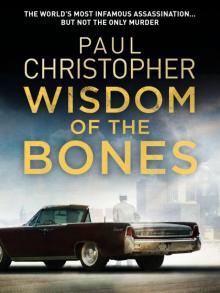 Wisdom of the Bones
Wisdom of the Bones The House of Special Purpose
The House of Special Purpose The Second Assassin
The Second Assassin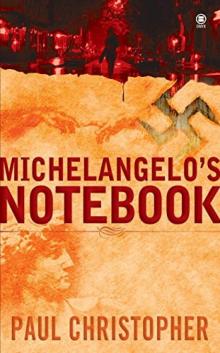 Michelangelo's Notebook
Michelangelo's Notebook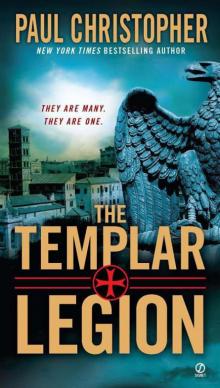 Templar Legion
Templar Legion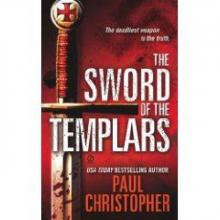 The Sword of the Templars t-1
The Sword of the Templars t-1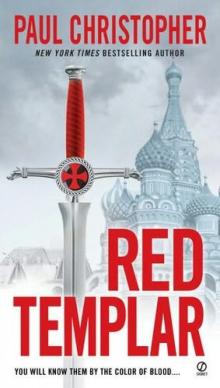 Red Templar
Red Templar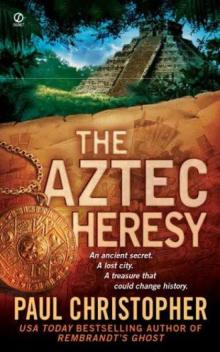 The Aztec Heresy
The Aztec Heresy The Templar Legion
The Templar Legion Rembrandt's Ghost
Rembrandt's Ghost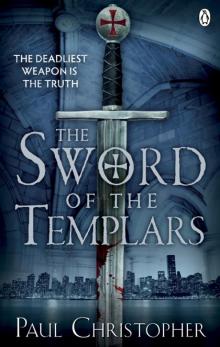 Sword of the Templars
Sword of the Templars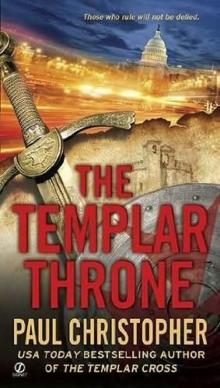 The Templar throne t-3
The Templar throne t-3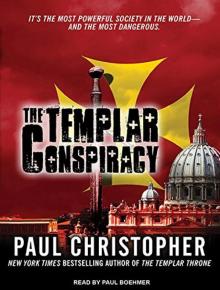 The Templar Conspiracy
The Templar Conspiracy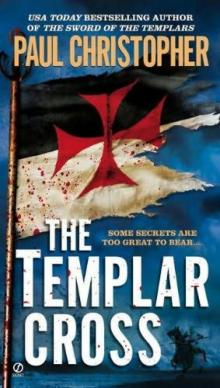 The Templar Cross t-2
The Templar Cross t-2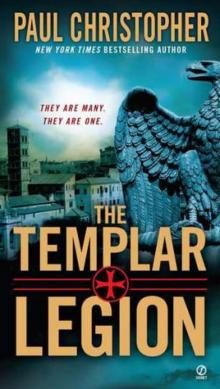 The Templar Legion t-5
The Templar Legion t-5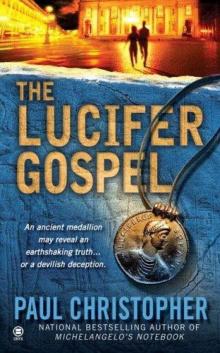 The Lucifer Gospel
The Lucifer Gospel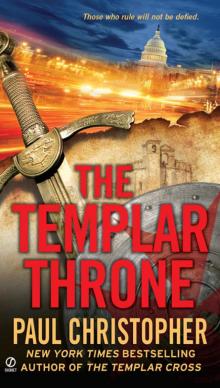 Templar Throne
Templar Throne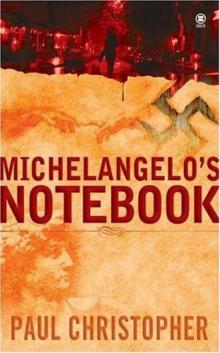 Michelangelo_s Notebook fr-1
Michelangelo_s Notebook fr-1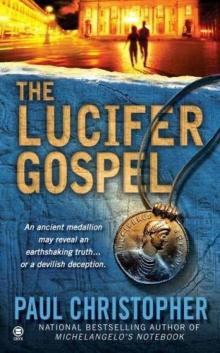 The Lucifer Gospel fr-2
The Lucifer Gospel fr-2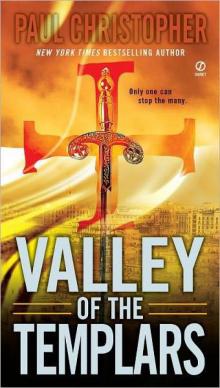 Valley of the Templars ts-7
Valley of the Templars ts-7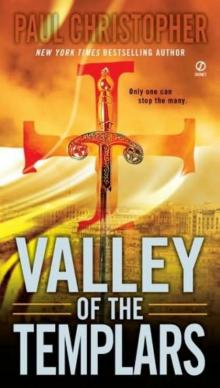 Valley of the Templars
Valley of the Templars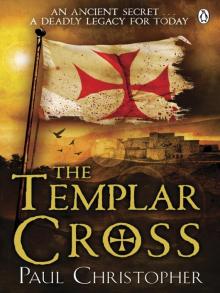 Templar Cross
Templar Cross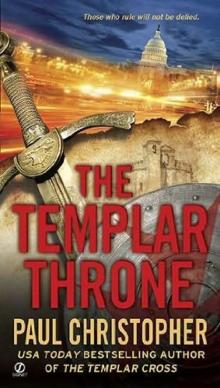 The Templar Throne
The Templar Throne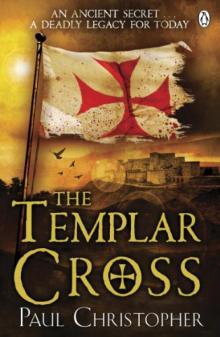 The Templar Cross
The Templar Cross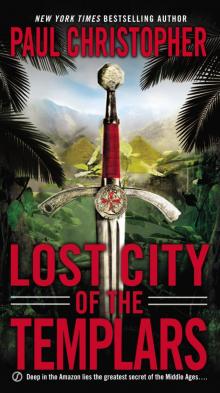 Lost City of the Templars
Lost City of the Templars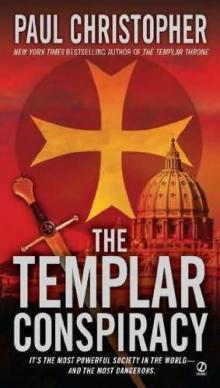 The Templar conspiracy t-4
The Templar conspiracy t-4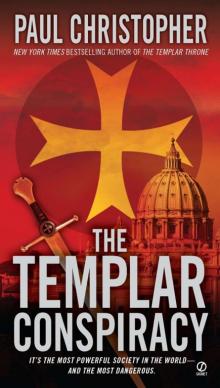 Templar Conspiracy
Templar Conspiracy